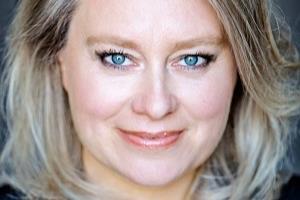
Hamburg-based production company Junafilm is marking its 15th anniversary this year with the world premiere of English-language thriller Spirit In The Blood on home turf at Filmfest Hamburg.
The Hamburg connection runs strong in Spirit In The Blood, which is directed by Canadian-born, Hamburg-based Carly May Borgstrom.
It was also backed by new Filmfest Hamburg director Malika Raballah in her previous job as head of funding at regional fund MOIN.
“Malika had been a great supporter from the very beginning,” says Junafilm founder Verena Gräfe-Höft. “She saw the film in a very early phase at a test screening when she was still at MOIN and wrote to me: ‘Verena, where did you get these lead actresses [Summer H. Howell and Sarah-Maxine Racicot] from? They’re an absolute sensation!”
The film shot in Ontaria in Canada and is about a group of teenage girls who decide to fight against the evil spirits they believe killed a young girl in a secluded religious mountain community. International sales are handled by Protagonist Pictures.
“It wasn’t easy financing an English-language film out of Germany as lead producer and also being a debut. I don’t think that I would have succeeded if I hadn’t had partners like MOIN and Protagonist as sales agent at my side,” says Gräfe-Höft.
Spirit In The Blood will be released in Germany by Weltkino on November 7 and begin its international festival career after Hamburg with a screening on October 6 at its next festival airing at Sitges - International Fantastic Film Festival of Catalonia.
International slate

Gräfe-Höft has always placed an emphasis on genre films in her company’s output, beginning with Katrin Gebbe’s Nothing Bad Can Happen which had its world premiere in Cannes’ Un Certain Regard sidebar in 2013.
This was followed six years later with another collaboration with Gebbe on Pelican Blood, the opening on Venice’s Horizons section, and Michael Venus’ debut feature Sleep which had its premiere at the 2020 Berlinale.
Her development slate includes another collaboration with Borgstrom, this time an as-yet-untitled story set among witches in Germany, as well as the German-language high-end revenge drama series Kliffende by Lena Krumkamp.
Gräfe-Höft does not restricting herself only to genre. Junafilm is developing family series Fiasól, based on a bestselling series of children’s books, with the Icelandic company Ursus Parvus. Borgstrom is working with the books’ author Kristin Helga Gunnarsdóttir on the scripts and she is set to direct two of the episodes at locations in Hamburg.
From the outset, Gräfe-Höft has made a conscious decision to position her company as an international player - either as a majority producer on German feature films aimed at the international market or as the minority partner on international co-productions such as the children’s films Antboy - The Revenge of the Red Fury and Antboy 3, and the Icelandic drama The Swan.
Over the years she has built up a network of international contacts by participating in training programmes such as EAVE, European TV Drama Lab and Inside Pictures. It was while taking part in the Producers on the Move initiative in Cannes in 2017 that she met Mila Voinikova of Miramar Film who subsequently became her Bulgarian co-producer on Pelican Blood.
“At the moment, I’d say that probably more than 50% of my projects in development are planned with international partners,” Gräfe-Höft explains.
She is working with writers from the UK on a mini-series by Katrin Gebbe about a young woman who becomes the muse of Marquis de Sade, has a Spanish co-producer attached to director-cinematographer Sebastian Egert’s debut feature Agua Dolce, and is looking to attract co-producers from Finland and Scandinavia for Julia Drache’s The Uninvited Guest (working title) which is one of the projects selected for this year’s ACE Producers’ workshop programme.
“Looking back at these first 15 years, the highlights for me personally have been about building up a network of people within the industry as my creative family, who have gone from being colleagues to becoming friends,” Gräfe-Höft says.
“What has always been important for me is to make films that stick in your mind, ones where you can spend some time reflecting on what you have just seen up on the screen. And as one colleague wrote recently to me ‘Your films ask more questions than they answer.’”















![[L-R]: Amanda Villavieja, Laia Casanovas, Yasmina Praderas](https://d1nslcd7m2225b.cloudfront.net/Pictures/274x183/6/4/1/1471641_pxl_20251224_103354743_618426_crop.jpg)






![[L-R]: Amanda Villavieja, Laia Casanovas, Yasmina Praderas](https://d1nslcd7m2225b.cloudfront.net/Pictures/100x67/6/4/1/1471641_pxl_20251224_103354743_618426_crop.jpg)


No comments yet